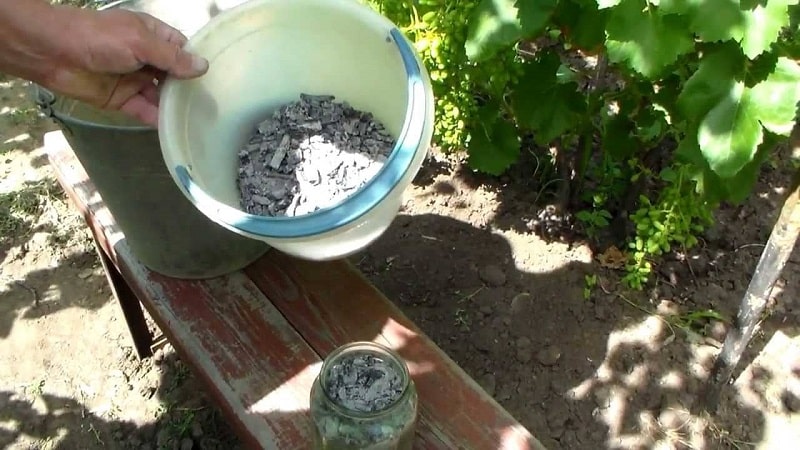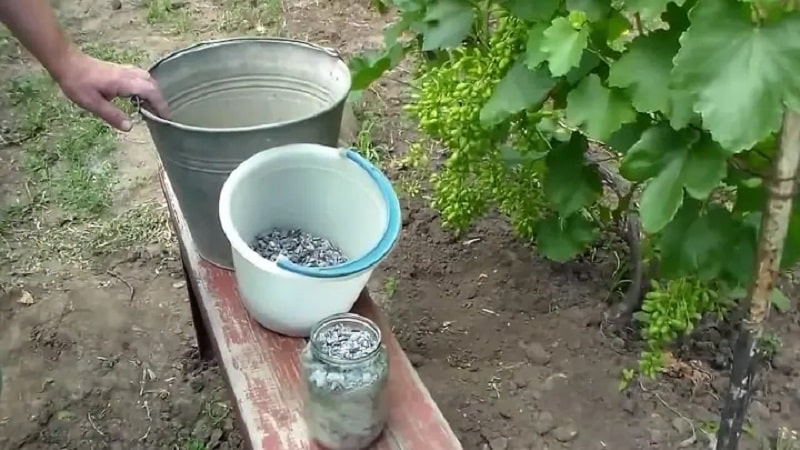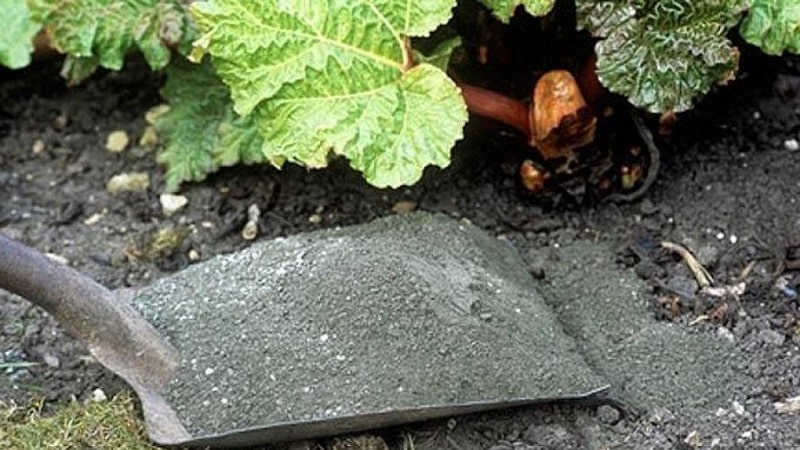The benefits of fertilizing grapes with ash in summer and how to apply it correctly
Grapes are one of the most popular garden crops, which are planted even in the middle zone. Breeders bred many varietiesfeeling comfortable even in the cold winter. However, such plants often produce small and sour harvests. To get tasty berries, it is important to feed the southern guest correctly.
Why feed grapes with ash?
Ash is one of the most valuable fertilizers for any plants.. It is recommended to collect it in separate containers and then use it as top dressing.
Attention! The composition of the ash largely depends on what crops were burned. Thus, the highest calcium content will be obtained from old trees and potato tops.
The organic product contains a lot of potassium, phosphorus and about 30 other microelements, which ensure the development of plants and protect them from external influences.
Benefits and effects on grapes
More often the product is used to neutralize acidic soilsso that the grapes grow in comfortable conditions and receive the maximum amount of nutrients.
Useful properties of ash:
- prevention of fungal diseases;
- destruction of some species pests;
- stabilization of water balance due to the high content of potassium and calcium;
- development of the root system due to phosphorus;
- activation of metabolism;
- formation of dense bunches of grapes;
- acceleration of growth of stems and leaves.
Regular and long-term use of ash as fertilizer leads to chlorosis - a disease in which the activity of photosynthesis decreases.

How to determine the need of grapes for such feeding
Before you start fertilizing, it is important to make sure that the vineyard really needs in additional microelements and growth stimulation.
Some signs:
- chlorosis as a result of nitrogen deficiency (yellow leaves, small and thin shoots, rapid wilting);
- burns along the edges of leaf plates;
- death of individual stems and parts of grapes;
- rolling leaves into tubes;
- purple hue of the plant.
Even if individual leaves begin to curl, wilt or change color, it’s time to think about feeding.
Timing for feeding grapes with ash in summer
The timing of fertilizers affects the quality of grapes and their yield.
Traditionally, it is recommended to fertilize 5 times a year.:
- 1 - in spring;
- 3 - in summer;
- 1 - in the fall.
There is a general scheme for adding ash in summer, but the feeding options are chosen independently, and the timing is adjusted depending on weather conditions and personal capabilities:
- Fertilizer is applied for the first time several weeks before flowering (late May or early June);
- the second time - after flowering, but before the berries appear (in mid-July);
- last one - before the start harvest ripening (mid-August).
If after flowering you use other complex fertilizers together with ash, the overall yield will double.
How often to repeat the procedure
The number of procedures directly depends on the chosen application method. It is enough to dig a liquid solution with complex fertilizers once into the ground next to the root system of the bush. It is better to spray twice, with an interval of 5–7 days.
Attention! Try not to leave dry ash on the crown and stems. It may leave burns that damage the grapes.
If the ash is simply scattered around the bush to protect against pests, the procedure is repeated 3–5 times depending on weather conditions and the general condition of the plant.
How to prepare fertilizer for grapes from ash
The easiest option is to use a dry mixture. Some gardeners use it too often, putting the grapes in danger, since they do not receive the proper amount of nutrients, and burn marks remain at the base.
Application options
It is recommended to mix ash with liquid substrates or water so as not to harm the plant.
Such methods allow you to target each problem precisely, ensure better absorption of nutrients, and reduce soil acidity.
Basic options for fertilizing:
- liquid mixture with water for irrigation;
- dry ash;
- strained solution for spraying;
- infusion of laundry soap;
- ash extract;
- liquid mixture with complex fertilizers;
- layer-by-layer mixing of ash with compost.

You cannot use all methods at the same time. It is better to divide them into several applications in accordance with the scheme. For example, it is advisable to carry out spraying in the spring, and water feeding in the summer.
Proportions and instructions
The first method of preparing the hood:
- 1 tbsp. Pour wood ash (about 100–150 g) into a galvanized bucket.
- Fill the container completely with hot water. Mix the contents thoroughly and leave for 2 days.
- On the 3rd day, mix the aqueous solution again and apply.
Second way:
- 1 tbsp. Pour the ash into a bucket in the evening and add 1 liter of hot water, mix thoroughly and leave overnight in a closed place.
- In the morning, add another 9 liters of cold water to the container. Bring the consistency to a homogeneous state and use for watering.
The product is used for spraying:
- Pour 300 g of ash into 300 ml of water. Stir and place on the stove. Boil for 30 minutes, cool and strain.
- Rub a piece of laundry soap and gradually introduce it into the solution.
- Add another 10 liters of water, stir and strain a second time. After this, start spraying.
Ash is rarely used in its pure form.. To apply it to the soil or directly to the leaves, it is better to dilute the mixture with water. In other cases, you must either maintain a distance from the plant or mix the product with other fertilizers (for example, compost).
How to apply correctly
Even good fertilizer can harm a plant if used incorrectly..
Due to the high content of phosphorus and calcium, when applied in large quantities, ash negatively affects the acid-base balance of the soil.
Instructions for fertilizing in different ways
To get it right fertilize, it is important to understand exactly which parts of the plant it will affect.
Recommendations for using dry ash:
- never scatter the mixture near the trunk and stems;
- do not leave ash on leaves, flowers and fruits;
- it is better to mix the fertilizer with the soil and distribute it around the grapes if it is a single plant, or between the rows if it is a large plantation;
- use compost to “mitigate” the effects of ash: lay it in layers around the plant, with compost on top;
- in windy weather, it is better to spill water on the places where the mixture was added;
- if the soil is acidic, about 4 kg of fertilizer per plant will be required (for soil with a normal alkaline balance - approximately 2 kg per adult bush).
For young plants (up to 2–4 years) you will need 2 times less ash.
When using liquid mixtures it is important to follow the recommendations to get the maximum benefit from feeding:
- do not water for 2 days in a row;
- for better absorption of fertilizer by the root system, make a hole around the plant and pour the solution inside, lightly sprinkle with soil;
- do not water grape leaves with products that are not intended for spraying, to avoid burns;
- do not treat with infusion or solution in rainy weather;
- do not use highly concentrated mixtures, always dilute the ash and infuse;
- mix fertilizers in advance so they work together;
- Do not use more than one additional fertilizer together with ash.
To water the plant you will need 10 liters of liquid (for 1 dose). The ditches between the rows are filled with water to a height of 20–25 cm. It is better to dig holes at a distance of 30–40 cm from the central trunk (the same parameters are relevant for burying dry ash).
For small plants, 2-3 liters of liquid is enough for watering, and the average - 5–7 liters.

What mistakes to avoid
It is difficult to do something wrong when applying fertilizer, but there are times when gardeners make mistakes due to ignorance or carelessness.
The most common mistakes:
- adding dry ash in direct sunlight;
- using a hot mixture for spraying or watering;
- digging deep holes and holes to distribute fertilizer;
- frequent repetition of the procedure (more than 3 times during the summer, several days in a row);
- application of fertilizing during harvesting;
- excessive addition of ash.
How to feed grapes with ash at different stages of growth
The choice of fertilizing method is determined by what stage of growth the crop is at.. If it is a young cutting, it is better to pour the ash into the hole before planting and mix thoroughly with the soil. Ideally, pour the mixture over and let it sit for a few days.
It is recommended to spray an adult plant that does not bear fruit.. The same method is used before flowering begins.
Universal method - root watering, which is carried out in most cases without causing damage to the vineyard.
Adviсe
A few tips that will allow you to better navigate the issues summer feeding grapes:
- give preference to root fertilizers;
- do not use dry ash often;
- do not carry out summer spraying at temperatures below +23°C;
- Before applying fertilizer, carefully inspect each plant.
Conclusion
Grapes require increased attention from the gardener. To get a good harvest in the fall, you need to devote time not only to watering and pruning, but also to the correct selection of fertilizers.
Ash is a universal remedy that can harm grapes only in large doses. It helps fight chlorosis, leaf curling, and wilting of the bush.